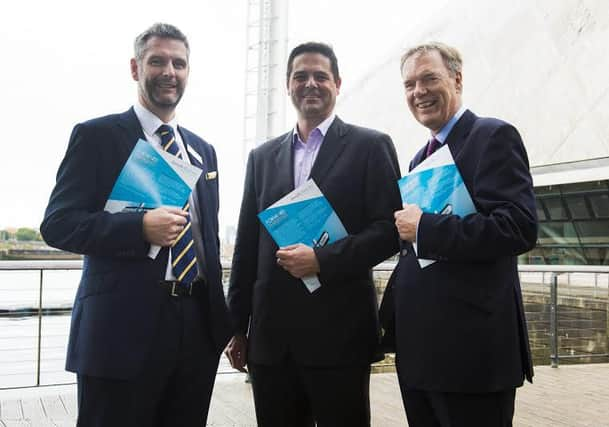Half of working Scots will lose jobs to technology


Speaking at a leadership masterclass at Glasgow’s Science Centre, futurist Dr Graeme Codrington and Crawford Gillies, Chairman of Scottish Enterprise gave attendees an insight into how the world of work is shifting here in Scotland.
Opening for Dr Codrington, Gillies spoke about the importance of leadership development and its significance in the future of Scotland’s workforce. “We need to be agile, we need leaders. Leaders who are more willing to experiment, more willing to fail, to learn from failures. There is no shortage of opportunity in Scotland in industries like manufacturing and agriculture.”
Advertisement
Hide AdAdvertisement
Hide AdThe job of Scottish Enterprise going forward will be to help examine needs of businesses and develop leadership to facilitate that growth.
Disruptive forces
Dr Codrington believes that by 2025, half of working people will lose their jobs to technology.
However, if we invest time in understanding technology, especially with our children, the results won’t be so devastating.
“The world of work is more disruptive than it’s ever been” Dr Codrington stated. Over the past 150 years, the change has been dramatic. Technology has been the biggest driver of this change, allowing us to work from anywhere and across multiple time zones, meaning the structure of the working day has changed significantly.
“I think what we have to do a lot better is embrace technology”, Dr Codrington explained. “Bring it into our schools, make sure there’s wifi so that every child can use it. A lot of work places, especially in meetings, tell you not to use your phone - it’s like telling me not to use my hands.
“I understand people get worried about becoming addicted to technology, but it would be the same if your child got addicted to reading. If they were doing anything for fifteen hours a day you would think it was a bit excessive. We want our kids to read, we want them to learn, so why would you not put a smart device in their hand? Actively invest your day in technology.”
One of the major changes in our working, and everyday life, is life expectancy. Dr Codrington advises that we must change our views on how we’re going to live, when we will retire and plan for the future. Those born in the 1990’s, he explains, could live through three centuries and this should change how we think about our careers. It should also change our working environments. Workforces are increasingly getting older, leaving fewer jobs for younger candidates. Training on how to work with someone as old as your mother or young as your children should be offered, to enable communication to be as effective as possible.
“Life expectancy is increasing by one and half days a week, by the time you get to Sunday you will have added another day and a half to your life” the futurist explained. As parents also continue to live longer, it is increasingly likely that they will run out of money - we will have to pay for our parents, according to Dr Codrington.
Develop adaptability
Advertisement
Hide AdAdvertisement
Hide AdDespite the fundamental changes that will continue to take place, Dr Codrington and his team of researchers at TomorrowToday believe that adapting is the best way to survive.
“The first step in making those changes, is acknowledging disruptive forces. Accept the change and try and understand.
I don’t think anybody is really scared of change, I think they’re scared of change that they don’t understand and change we can’t control. Change your picture of what you think the future is going to look like. I think from there will then flow a new set of skills and habits.”